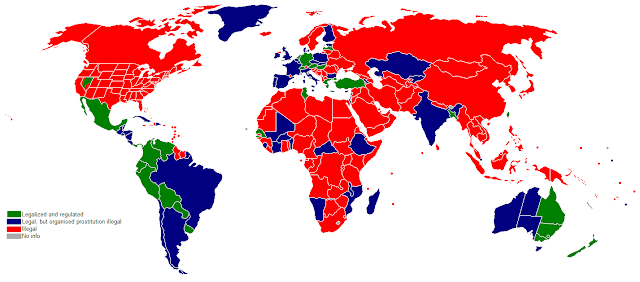http://www.wmagazine.com/wp-content/uploads/2015/01/fifty-shades-of-grey-on-set-4.jpg
Let’s talk about sex. In our modern
society sex is almost as inevitable as winter in Finland.
It can be seen very frequently in persuasive advertising in almost any media,
can be found directly on the internet in the form of pornography and also can
be heard from my upstairs neighbor. Sex is something that humans as mammals
have been of course interested throughout the history.
As you might guess, sex is used very
efficiently in the field of business. Sexual persuasion is used very frequently
in marketing; especially young women and men can be represented in the media
almost as sexual objects. Also the annual revenue of the porn industry is estimated to be annually $2.6 billion to $3.9 billion. There always exists a
demand for some form of sex, which makes sex a much demanded product.
Pornography and sexually persuasive
advertising aren’t illegal but widely condemned. But prostitution is still
illegal in different parts of the World. For example in Finland buying sex is
legal, but unregulated. In countries like Germany, Switzerland and the
Netherlands buying and selling sex is legal and regulated. In USA, for instance,
buying sex is illegal and prostitution is criminalized. The chart showing the worldwide legislation of prostitution can been seen below.
Although its criminalization,
according to TNS’ study in 2004, 15 % of American men have at least once paid
for sex during their lifetime. Human trafficking is one of the World’s biggest
current issues and it still exists and keeps the illegal prostitution in going.
More than 500,000 women are trafficked into Western Europe every year, says the
International Organization for Migration. These points doubt the effectiveness
of criminalization of prostitution. Prostitution has been said to be the
world’s oldest profession, since the signs can be found as far as from the 18th
century B.C. Prostitution has always been there, and always will be.
The purpose of this text is not to
give support or objections against prostitution. The purpose of this text is to
analyze the potential effects of legalizing and regulating prostitution in a
way it is done currently in Germany and the Netherlands. Could there be any
actual positive effects or will the common welfare become worse?
If prostitution is a regulated
industry with many agents, then the organizations must pay corporate tax like any
other firm. Cities can earn tax revenue from other sources also: For example the
city of Bonn collected on average 250,000€ from a “sex tax,” which collected
revenue from saunas, brothels, and street pay meters in 2011. Also we must not neglect the effect of so called “sex tourism”, where foreigners
travel to countries where prostitution is legal and thereby stimulate the
economy through consumption.
Also the sex workers themselves have
to obviously pay income tax from their income. The sex-workers also don’t
necessarily have to work in brothel for a pimp; they also can be given the
opportunity of entrepreneurship. In Germany they also already have access to
health insurance and social security benefits.
http://assets.vice.com/content-images/contentimage/no-slug/f91fd263a0caf8666a75b80258f9dab1.jpg
One of the major concerns of
prostitution is human trafficking. Some evidence is shown that the legalization
of prostitution attracts women who are legally seeking for job opportunities,
but unfortunately also human traffickers who force women into sex. Although sex
workers in Germany have the right to demand proper work conditions and work
safety guidelines for themselves, the monitoring of the victims of human
trafficking needs to be addressed more. With proper regulation, it might also
be easier to monitor and help the victims of human trafficking who are forced
to sell their body. Also without proper regulation, the spreading of AIDS and
other STD’s can cause major costs for the economy in the form of increased
health-care expenditure.
Also the existence of labor unions
for prostitutes can help the reduction of human trafficking, Not only the
brothels and the state would monitor human trafficking, but also the unions.
The unions could assess a strict control on who is fulfilling the requirements
to work as a prostitute.
So far we have assessed the effects
of prostitution into fiscal policy and unemployment, but what about the social
effects? One concern is that the representation of young women in the society
could become much worse. When legalizing something so objectifying, women could
be seen as nothing more than sexual objects. When prostitution becomes more
common and can be seen on everywhere every day, there exists a danger of
objectifying young women even more. In extreme cases this can lead to increased
numbers in sexual offending.
The Netherlands, Germany, Austria,
Switzerland and Greece have already accepted regulated prostitution and
brothels. By regulating prostitution, it could be possible to increase the government’s
tax-revenue, reduce the unemployment and most importantly, put the lights upon
the problems of human trafficking and sex slavery. However, once must consider
the social consequences of such a radical legalization for the society.
As a conclusion we still could state that sex indeed sells.
Text: SW
Pictures don't belong to me




No comments:
Post a Comment